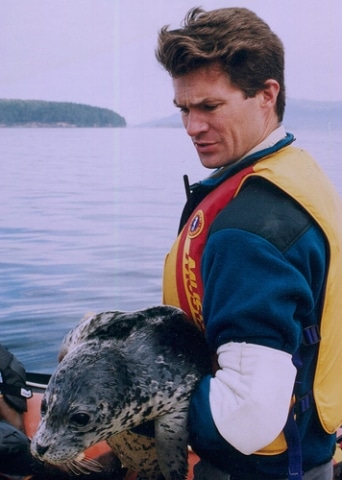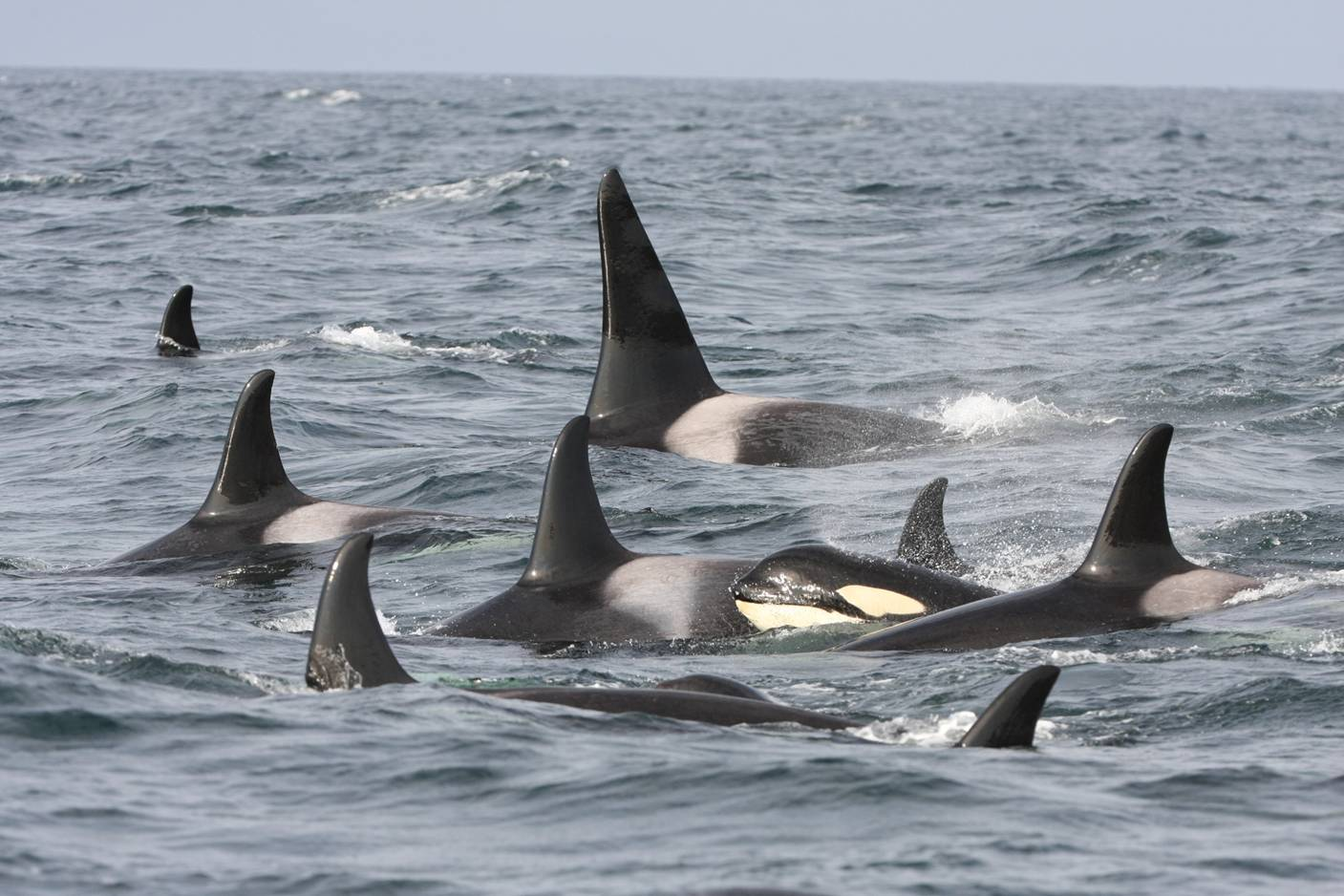When the Harper government announced deep funding cuts to science programs across the country, the Institute of Ocean Sciences, one of Canada’s largest marine institutes located in Sidney, B.C., was among those research outfits hurt as a result. Lead research scientist Peter Ross is one of more than one thousand Department of Fisheries and Oceans (DFO) employees who discovered their position had been terminated.
Peter Ross is no lab coat-wearing, science nerd. At least, not entirely. He’s an oceanic adventurer and Canada’s preeminent orca expert. He discovered things about West Coast orcas that have transformed common marine mammal knowledge around the globe.
Orcas on the west coast of British Columbia will no longer be monitored for contamination once Peter Ross’ research concludes this spring. Come April Canada will no longer have a federal marine contaminants research program anywhere in the nation. Photo credit: Brian Grisborne, used with permission.
When you dismantle science and research programs, says Ross, you are doing much more than limiting your capacity for science and research: you restrict your capacity to engage with your environment, the source of social well-being and a flourishing economy. And you cripple your decision-making capabilities by disregarding the line that separates fact-driven, science-based decision-making from ideology or profit.
And that’s what bothers Ross so much about the Harper government’s recent decision to shutter many of Canada’s prestigious scientific institutions. It’s not simply a matter of budgetary restraint or the restructuring of federal bodies. It limits science pursued in the public interest.
This is part 1 of an interview with Peter Ross. Part 2 available here.
Carol Linnitt: Hello, Peter. So, let me jump right in. The reason I’m calling is because I’d like to talk to you about the cancelled funding for the Institute of Ocean Sciences.
Peter Ross: Yes, so the Institute will still be open, it’s a large Institute, but the marine contaminants program has been axed.
CL: And has that already happened?
PR: We’re still here, but we’re winding down, so, in effect, probably by the springtime we’ll be shut down.
CL: And how many employees will that be? I know that you’re heralded as Canada’s only marine mammal toxicologist, but is there a team that you work with?
PR: Yes, there are 55 full time staff nationally that consist of scientists, technicians and chemists, and they’re scattered across the country. There’s nine of us here in Sidney, B.C., probably the same number in Winnipeg for the Arctic, and then a number in Rimouski, Quebec, and a few in a couple of spots in the Maritimes.
CL: And so by the time the spring hits, all of those …
PR: Will be gone. Probably one quarter are already gone.
CL: So what happens when these positions get cut? Are scientists fired? Are they moved into new positions?
PR: That will vary. Essentially you get a letter saying that your services are no longer required, and you have three choices. One is to resign, and you’ve got 120 days to do so. Another is to take educational leave, which gives you two years of leave without pay, to go to school again and retrain, and then you can come back and re-apply for a new position. The third is you can apply for a position that may be open in the government right now. But you would have to work on something other than what you trained for.
CL: And what positions are coming open right now?
PR: Well there’s a fair bit of downsizing in the government right now, so there aren’t a lot of jobs coming open. And for some, like myself, who are trained as research scientists, there are really no jobs coming open. I’ve been told that my expertise is not wanted within the government. So that’s sort of a mixed answer. I think some of the technical staff will be more likely to find success regaining employment within government because they’re a bit more versatile in terms of training. But for someone like me, no, there’s very little hope that there will be any position for me, unless I want to go into management.
CL: What’s the difference between a technician and a research scientist?
PR: Training. A research scientist has a Ph.D., and within the government your job is to do ground breaking research, which you publish in international journals. You become the government’s expert in that field, so you are appraised every year in terms of your performance, And your performance is based on the number of publications you appear in and their impact on public policy. A technician may be someone working in a laboratory or in the field, but in a supporting role for a research program, led by the research scientist.
CL: Does that mean that if there’s an overall reduction in research positions, Canada is taking a step back as a country within the international scientific community?
PR: Well, you know science is a funny thing, and it’s often hard to do justice in defining it or describing it to a lay-audience. I think science is different things to different people. When I look at the kind of research that I do, I work for the government. I work for the Crown. I work for the taxpayer. I work on projects for which I have to raise and attract money. These are projects that ultimately help us to manage and protect our oceans. So when I look at the work that I am interested in getting involved in, or that I’ve attracted funds to support. I’m ultimately asking, ‘Does it help me to better understand the ocean? Will it empower us to manage or protect our ocean resources?’
If I were at a university I might do similar research, but I’m less likely to be wed to the idea that I have to protect Canada or Canadian natural resources. Or that I have to work within the confines of a mission, a mandate, and legislative framework such as the Oceans Act, Species at Risk Act or Fisheries Act. So the way I go about science will be similar to an academic, but the context and the implications of my work will differ quite a bit, because I am on the hook and responsible for a certain file. If it emerges as an issue in Canada, if there is a public outcry about a certain chemical, process or industry, and the minister’s office calls down for advice from us, or need answers fast, I would be one of those people that would have to jump. If I was at university, I wouldn’t be compelled to do the same
CL: So your position is where the scientific rubber meets the policy road?
PR: I think so, yes. Ultimately, the government isn’t in the position of just spending money on research and development for the sake of spending money on science and knowledge. It likes to know what kind of research gets done and that it will improve the government’s ability to protect Canadians, wildlife, natural resources, Canadian sovereignty, all of those things. And that would be different for a faculty member at a university. They might have such aims, but they are not required to think in those terms.
CL: I see. I was speaking with Andrew Weaver from the university of Victoria recently, and he broke the nature of science production into three categories: industry-funded science, academic curiosity-driven science, and government taxpayer-funded science in the interest of the public good. He said that if we’re seeing reductions in science being pursued for the public good, then science really gets left to industry and the academy, and neither of those have the same obligation to the public and to taxpayers.
PR: Well that’s right. Industry is not going to say, “I want to look at all ninety thousand chemicals on the Canadian market, and every problem in the ocean.” What industrial sector is going to pick up that file? None. What industry can be very good at is monitoring certain effluents, or a pipe that’s discharging contaminants within a certain sector – something that’s really focused on a certain activity. Otherwise why would they pay for it? They’re only going to pay for the kind of monitoring or research that has a direct bearing on the performance of their specific economic sector.
That’s where government science is very different. I am, for example, looking at marine mammals and marine mammals aren’t being contaminated because of a single sector. They are getting contaminated because of thousands of different sources of thousands of different chemicals in Canada, the United States, and internationally. And so, all these chemicals are essentially accidents or mistakes or processes that are leading to contamination of the ocean, and some of these chemicals build up in food webs and mammals.
Someone like me comes along and says, “Okay, that’s what I’m finding, now what does that mean? Is it affecting the health of the population? And if so, where is this chemical or that chemical, or that other chemical coming from? Is it banned in Canada? Is it used as a pesticide in agriculture? Has it come from pulp mills? Does it come from sewage effluents?” And then we track these things down and work with regulators in Ottawa and Washington, D.C. We would also potentially work with the industry that is producing the compound, or releasing it. We work with regional governments, and the province. So ultimately, what we try to do within government is that kind of ‘ecosystem’ approach to science, or habitat-based approach to science. That approach would be of little interest to an industrial sector. It’s highly focused.
CL: So if we’re talking about something like research into contaminants in marine species, and we see a large reduction in research scientist positions, what will happen? Does it get dropped? Does it mean that we’ll no longer be studying this issue?
PR: That’s correct.
CL: So, no one is studying the contamination of marine environments and mammals once you close up?
PR: Well it’s up to whomever to do whatever they want right now. There is no leadership, there’s no guidance, there’s no instruction, there’s no requirement. The only thing that’s going to make somebody interested in working on this is going to be money. Who’s going provide the money? This kind of work is very expensive. You can’t go out in the ocean and understand what’s going on without access to boats, expensive sampling gear and partners in multiple sectors to help you understand all the other processes that are important from the perspective of pollution. This applies whether it’s ocean currents, ocean productivity, or the life history of different species or food web structures.
The lab work is very expensive. We have two lines of research that we have been applying routinely in our study designs. One is, what are the health implications of the chemicals to which they’re exposed? That’s toxicology. That’s looking at the health of salmon, the health of seals, the health of killer whales, and it is very difficult, very expensive work. The other involves what chemicals they are exposed to. That’s chemistry. We have to get samples from animals, measure those chemicals, and it can cost two thousand dollars to measure a single sample. So if we eliminate these programs, the work is going to be left up to people other than government, which means universities or industry. Somebody might do something, but are they going to be compelled to be responsible for everything? No.
CL: It’s not just your outfit that’s had its funding cut and positions lost. This is happening all across Canada, with similar research. What is the significance of that for Canada?
PR: Well I think that it’s easy to ignore research and science when one is operating in the mainstream of Canadian public life or society. We often don’t see the immediate benefits or applications of science. I think we forget that the well being of our human population, our quality of life, is largely dependent on a healthy environment. And I think we often forget that it’s scientific research that has led us to discover and uncover a lot of that wealth and to harness it. But we ignore it when that same science also identifies limits to our wealth generation, development, or ways in which we can channel development so that it’s constructive and not negatively impacting aspects of society or the economy.
I think we often forget the inherent and intrinsic value of science and how it does, and has, contributed to the Canada we know today. If we start to ignore scientists and the expertise within the Canadian scientific establishment, we will be losing the ability to manage our future success, the ability to understand threats to the Canadian way and the ability to adapt and grow. We will, I think, lose a little bit of control over our future. It’s by having our finger on the pulse of what’s happening in the ocean, the freshwater environment or terrestrial habitats that allows us to provide advice that will help us manage those things and to maintain vibrant economies associated with the coastal waters, the oceans, freshwater ecosystems, or terrestrial environments. So I think it’s diminishing our ability to adapt, to manage, to predict, and to maintain the investment that we have in the Canadian way of life.
Read Part 2 of Retreat from Science.
Cover Image Credit: Lizzy Moss, used with permission.
Subscribe to our newsletter
Stay up to date with DeSmog news and alerts








